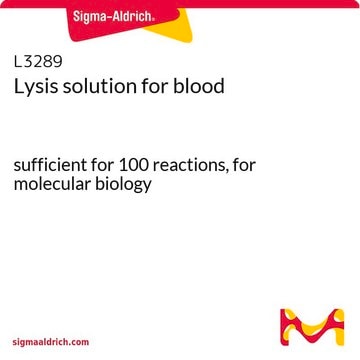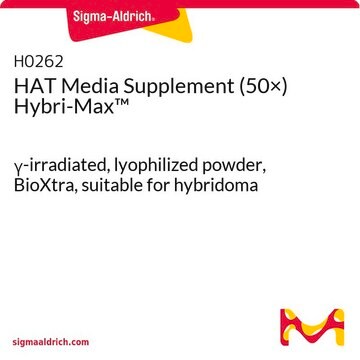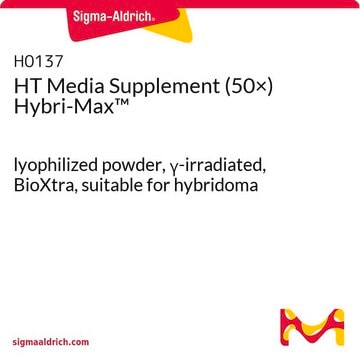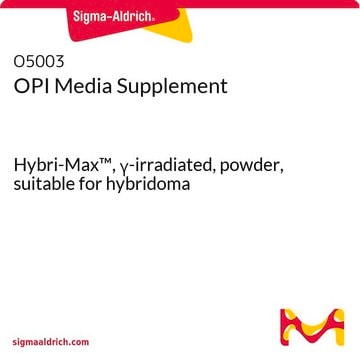R7757
Red Blood Cell Lysing Buffer Hybri-Max™
Liquid, sterile-filtered, suitable for hybridoma
Synonym(s):
RBC Lysing Buffer
Sign Into View Organizational & Contract Pricing
All Photos(1)
About This Item
UNSPSC Code:
12352207
NACRES:
NA.75
Recommended Products
product name
Red Blood Cell Lysing Buffer Hybri-Max™, liquid, sterile-filtered, suitable for hybridoma
sterility
sterile-filtered
form
liquid
technique(s)
cell culture | hybridoma: suitable
impurities
endotoxin, tested
Application
Recommended for use by adding 1 mL of buffer to a cell pellet (cell pellet = 1 spleen or 100-200 million cells). Gently mix for 1 minute. Dilute the buffer with 15-20 mL of medium or salt solution. Centrifuge at 250-500 × g for 7 minutes and decant the supernatant. Cells may be diluted and prepared for counting or fusion. If lysis is incomplete, steps 1-4 may be repeated.
Biochem/physiol Actions
Red Blood Cell Lysing Buffer has been developed for use in hybridoma protocols to remove red blood cells from mouse splenocyte suspensions before fusion. It is also useful in systems where it may be desirable to remove red blood cells from cell suspensions, such as whole blood.
Components
Contains 8.3 g/L ammonium chloride in 0.01 M Tris-HCl buffer.
Other Notes
Note: This product is intended for the removal of red blood cells from mice. This product may not be appropriate for the lysis of red blood cells of other animals. The suitability of the product in any application other than mouse splenocytes must be determined by the researcher.
Legal Information
Hybri-Max is a trademark of Sigma-Aldrich Co. LLC
Storage Class Code
12 - Non Combustible Liquids
WGK
nwg
Flash Point(F)
Not applicable
Flash Point(C)
Not applicable
Certificates of Analysis (COA)
Search for Certificates of Analysis (COA) by entering the products Lot/Batch Number. Lot and Batch Numbers can be found on a product’s label following the words ‘Lot’ or ‘Batch’.
Already Own This Product?
Find documentation for the products that you have recently purchased in the Document Library.
Customers Also Viewed
Jolieke G van Oosterwijk et al.
The Journal of clinical investigation, 128(1), 369-380 (2017-12-12)
Oncogenic addiction to the Fms-like tyrosine kinase 3 (FLT3) is a hallmark of acute myeloid leukemia (AML) that harbors the FLT3-internal tandem duplication (FLT3-ITD) mutation. While FLT3 inhibitors like sorafenib show initial therapeutic efficacy, resistance rapidly develops through mechanisms that
John M Furgason et al.
Mutagenesis, 29(5), 341-350 (2014-08-12)
Next generation sequencing has become a powerful tool in dissecting and identifying mutations and genomic structural variants that accompany tumourigenesis. Sequence analysis of glioblastoma multiforme (GBM) illustrates the ability to rapidly identify mutations that may affect phenotype. Approximately 50% of
Guoxi Yang et al.
Journal of cellular and molecular medicine, 21(12), 3445-3452 (2017-07-01)
Macrophage surface antigen-1 (Mac-1, CD11b/CD18) has been implicated in the regulation of osteoclastogenesis. In the synovial tissues of patients with aseptic loosening after total hip replacement, CD11b was up-regulated, which indicated that CD11b is closely involved in osteolysis around the
Prabhat K Purbey et al.
Immunity, 47(3), 421-434 (2017-09-21)
Environmental insults are often detected by multiple sensors that activate diverse signaling pathways and transcriptional regulators, leading to a tailored transcriptional output. To understand how a tailored response is coordinated, we examined the inflammatory response elicited in mouse macrophages by
Christopher J M Piper et al.
Cell reports, 29(7), 1878-1892 (2019-11-14)
Regulatory B cells (Bregs) play a critical role in the control of autoimmunity and inflammation. IL-10 production is the hallmark for the identification of Bregs. However, the molecular determinants that regulate the transcription of IL-10 and control the Breg developmental
Our team of scientists has experience in all areas of research including Life Science, Material Science, Chemical Synthesis, Chromatography, Analytical and many others.
Contact Technical Service












